|
|
|
Sort Order |
|
|
|
Items / Page
|
|
|
|
|
|
|
| Srl | Item |
| 1 |
ID:
065651
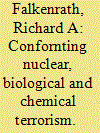

|
|
|
|
|
| Publication |
1998.
|
| Description |
p.43-65
|
|
|
|
|
|
|
|
|
|
|
|
|
|
|
|
| 2 |
ID:
134107
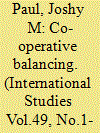

|
|
|
|
|
| Publication |
2014.
|
| Summary/Abstract |
The Asia-Pacific region is facing the threat of a number of potential military conflicts. Unresolved security challenges include the Sino-Japanese and Sino-Indian territorial disputes. The current peace and stability in the region has been achieved through various multilateral mechanisms and constant US involvement in the regional affairs. However, the declining US presence in Asia, the ineffectiveness of different multilateral institutions to establish a security order in the region and China's possible emergence as a great power in Asia may lead to the end of the status quo. In this context, it is pertinent that Asia should be free from both hegemony and power rivalry, and for that, 'co-operative balancing' is the best possible mechanism to achieve a long-term peace and stability. Co-operative balancing is a combination of power balancing and a co-operative security framework. It promotes the independent position of individual countries and strengthens the multilateral mechanisms. This essay concludes that India and Japan can balance against China while bilateral engagement among the three countries tends to reduce their distrust vis-à-vis China.
|
|
|
|
|
|
|
|
|
|
|
|
|
|
|
|
| 3 |
ID:
130600
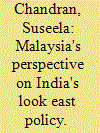

|
|
|
|
|
| Publication |
2014.
|
| Summary/Abstract |
The year 2012 completed 20 years of India's Look East Policy (LEP). Launched by former Indian Prime Minister P.V. NarashimeRao in 1992, this policy had its genesis in the end of the cold war following the collapse of the Soviet Union. To India, this policy was more than just a foreign policy alternative as it provided a development alternative as well, in synchronization with the globalization paradigm and the resurgence of Asia as an economic powerhouse. The 1990: saw a period rapid economic development and growth of Asian countries - especially Southeast Asia. With the abrupt collapse c the Soviet Union in 1991, India was left 'deprived' (the Soviet Union was lndia's strongest partner), and started to seek new markets t~
fuel its own economic growth. Thus Indian Prime Minister at the time P.V. Narasimha Rao, came up with the concept of a "Look East Policy for India. This was a policy of economic engagement with Southeast Asia and East Asia, to achieve two objectives. First was to encourage trade links with individual partners, and second, to provide foreign employment for India's own expanding work force (R.P. Khanna, 1991,6-7).
|
|
|
|
|
|
|
|
|
|
|
|
|
|
|
|
| 4 |
ID:
131706
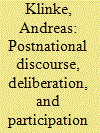

|
|
|
|
|
| Publication |
2014.
|
| Summary/Abstract |
An emerging task in world politics is to cope with human-induced global risks in domains such as environment, economy, security, and health. Current global governance institutions are largely incapable of tackling global risks and applying deductive policy models, which is why new modes of interaction may become essential. In this article I argue that through focused discourses, key peculiarities of global risks, namely complexity, scientific uncertainty and sociopolitical ambiguity, may be identified and understood. To this end, distinctively discursive and pragmatic learning processes can be developed. Different forms of deliberation and participation help develop processes that meet the challenges, problems, and conflicts that result from the key peculiarities of global risks. Hence, the article establishes a causal link between key peculiarities of global risks and postnational discourses. I discuss the varying forms of deliberation and participation (epistemic institutions, associational policy making, and transnational public deliberation and participation) of three discourses that produce institutional problem solving capacity in global risk governance. To this end, this article links theory and practice as well as normative conceptualisation and institutional feasibility.
|
|
|
|
|
|
|
|
|
|
|
|
|
|
|
|
| 5 |
ID:
131007
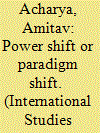

|
|
|
|
|
| Publication |
2014.
|
| Summary/Abstract |
This essay proposes a new theoretical framework for analyzing the rise of China and its impact on Asian security order. While the rise of China is reshaping Asia's military balance, the region has also witnessed equally important and longer-term changes, especially economic interdependence, multilateral institutions and domestic politics. The implications of these changes are not fully accounted for by the different types of security orders proposed by analysts to describe the implications of China's rise, such as anarchy, hierarchy, hegemony, concert, and community. This essay presents an alternative conceptualization of Asian security order, termed consociational security order (CSO) that draws from different theoretical lenses: defensive realism, institutionalism, and especially consociational theory in comparative politics. Specifying the conditions that make a CSO stable or unstable, the essay then examines the extent to which these conditions can be found in Asia today. Aside from offering a distinctive framework for analyzing China's rise, the CSO framework also offers an analytic device for policymakers and analysts in judging trends and directions in Asian security.
|
|
|
|
|
|
|
|
|
|
|
|
|
|
|
|
| 6 |
ID:
128246
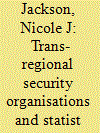

|
|
|
|
|
| Publication |
2014.
|
| Summary/Abstract |
This paper argues that there is an emerging trans-regional security complex reaching from Russia through Central Asia to China. Shared security norms have resulted in statist multilateralism, that is, state-directed cooperation on shared interests while closely guarding distinct identities and specific political features. The paper outlines member states' key political values and shows how they 'framed' shared understandings about security. It then explains how security norms inform the institutional designs of the two main multilateral security organisations thereby directing the nature of cooperation, testing the argument in two key conflicts: in Kyrgyzstan and Afghanistan.
|
|
|
|
|
|
|
|
|
|
|
|
|
|
|
|
|
|
|
|
|